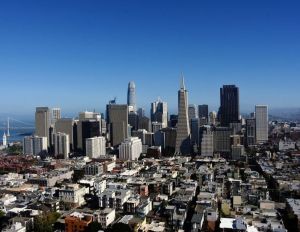US Cities Lead the World in Tech
San Francisco, New York and Silicon Valley are at the global forefront, according to Savills’ latest report.
The top three tech cities in the world are all in the U.S., according to Savills Tech Cities 2023 report. San Francisco leads the way, followed by New York and third-place Silicon Valley. And with the California towns holding two of the three top spots, the San Francisco Bay Area carries the distinction of being the preeminent global tech hub.
“As the fourth industrial revolution transforms business and industry, new tech sectors are driving growth, supporting demand for property in the cities that lead in them,” according to the report.
Savills examined a diverse range of factors in determining the leading tech cities. The London- based commercial real estate services firm assessed each market’s business environment, tech environment, city buzz and wellness, as well as strength and depth in 11 tech sub-sectors ranging from AgTech & FoodTech to SpaceTech. New York, may have ranked second in the world overall, but the city takes top billing globally in AgTech & FoodTech, FinTech, DeepTech and MediaTech.
READ ALSO: Top 10 Markets for Office Deliveries in 2022
Talent, however, is the leading measurement of success in the Savills ranking, as skilled labor is the backbone of the tech world. San Francisco, New York and Silicon Valley all have extensive talent pools and premier universities to keep the educated labor force flowing.
Taking all factors into consideration, Savills’ findings indicate that the U.S. far outranks Europe and Asia in tech leadership, with 15 U.S. cities holding a place on the list of the 30 principal tech markets of the world.
Upward bound
While the world’s established tech cities—the global markets that record the highest marks in depth of tech base, quality of life and supportive business environment, and attract the most venture capital—will continue to lead the tech industry, rising cities are making waves. “Big cities are back in vogue as the effect of the pandemic has eased, though smaller cities that offer more affordable living, easy access to green space and outdoor pursuits are also in high demand,” according to the report.
Rising cities, secondary global markets that often specialize in one tech sector, include the likes of Houston, Raleigh-Durham, N.C., and Denver. “These cities offer a quality business and education environment, combined with city living on a smaller footprint, benefitting as people sought a better quality of life in the wake of the pandemic. That allows easier access to amenities and a better work/life balance for residents, but with all the ‘buzz’ of larger urban centers.” Before the pandemic, neither Houston, Raleigh-Durham, N.C., nor Denver ranked in the top 30, having made no appearance at all in Savills’ 2019 report.
Other rising cities of note include Austin, Texas, which is the seventh-leading city in the world for MediaTech, and St. Louis, ranking eighth in the world in AgTech & FoodTech.
As rising cities grow in appeal to specialist tech companies, these metros are seeing a positive effect on their respective office markets. As noted in the report, specialist tech firms face evolving real estate needs as they grow in size, making the flight to quality at most levels and thereby bolstering the Class A office sector. And Class A accommodations in rising cities have a far more palatable price per square foot than those in established tech cities.
Although rising cities are attracting more attention, the leading tech hubs will continue to have a firm hold on their position at the forefront. The factors that make the big tech cities perform well, such as the depth of their talent pools and the weight of money flowing into them, are enough to keep them at the top of Savills’ index, Paul Tostevin, director with Savills Research, said in prepared remarks.








You must be logged in to post a comment.